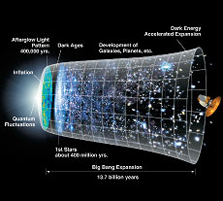


Time Line of the Universe. The expansion of the universe
over most of its history has been relatively gradual. The notion that
a rapid period “inflation” preceded the Big Bang expansion was first
put forth 25 years ago. The new WMAP observations favor specific inflation
scenarios over other long held ideas.
Credit: Image courtesy of NASA
Credit: Image courtesy of NASA

hat is ultimate reality and how can science shed light on it? That
is the challenging question being addressed by the program “Science
and Theology Advanced Research Series (STARS)” run by the Center for
Theology and the Natural Sciences (CTNS) with  the help of Templeton
funding.
the help of Templeton
funding.
![]() “The goal of STARS is to sponsor research by small teams of scientists
and humanities scholars on the ways science, in light of philosophical
and theological reflection, points towards the nature, character and
meaning of ultimate reality. The overall approach is to bring together
world-class scientists who are also willing to look beyond the limits
of their own discipline to ask such big questions as these: Is the
universe eternal or did it have a beginning? Is there purpose to life
and mind in the universe? Where do our values come from in light of
biological evolution?” says STARS Principal Investigator Robert John
Russell, the Ian G. Barbour Professor of Theology and Science in Residence
at the Graduate Theological Union. “The ‘big questions’ that STARS
raises are based on science, but they go beyond what science alone
can answer.”
“The goal of STARS is to sponsor research by small teams of scientists
and humanities scholars on the ways science, in light of philosophical
and theological reflection, points towards the nature, character and
meaning of ultimate reality. The overall approach is to bring together
world-class scientists who are also willing to look beyond the limits
of their own discipline to ask such big questions as these: Is the
universe eternal or did it have a beginning? Is there purpose to life
and mind in the universe? Where do our values come from in light of
biological evolution?” says STARS Principal Investigator Robert John
Russell, the Ian G. Barbour Professor of Theology and Science in Residence
at the Graduate Theological Union. “The ‘big questions’ that STARS
raises are based on science, but they go beyond what science alone
can answer.”
![]() The program first brought together around 150 scientists and humanities
scholars for a series of conferences in Cancun, Mexico. Dozens of small
teams of between two to six scholars, carefully balanced between science
and humanities, then competed aggressively for twenty $20,000 planning
grants for initial research over a six-month period. From among these,
five winning teams were selected in November 2007 to receive grants
of $100,000 for more intensive research. Two renewal grants of $200,000
will be available for continuing research by the most successful teams.
The program first brought together around 150 scientists and humanities
scholars for a series of conferences in Cancun, Mexico. Dozens of small
teams of between two to six scholars, carefully balanced between science
and humanities, then competed aggressively for twenty $20,000 planning
grants for initial research over a six-month period. From among these,
five winning teams were selected in November 2007 to receive grants
of $100,000 for more intensive research. Two renewal grants of $200,000
will be available for continuing research by the most successful teams.
![]() Since the project runs at least until mid-2009, it is too early to
predict major outcomes. But Russell has high hopes for the research
already being undertaken by the five STARS teams. He believes that
the teams are examining some really interesting questions whose solution
might enable scientists to throw off the reductionist claim that science
alone describes everything of important in the world. “If we want to
gain genuine knowledge about what really characterizes ultimate reality,
we need more research like that currently supported by STARS.”
Since the project runs at least until mid-2009, it is too early to
predict major outcomes. But Russell has high hopes for the research
already being undertaken by the five STARS teams. He believes that
the teams are examining some really interesting questions whose solution
might enable scientists to throw off the reductionist claim that science
alone describes everything of important in the world. “If we want to
gain genuine knowledge about what really characterizes ultimate reality,
we need more research like that currently supported by STARS.”